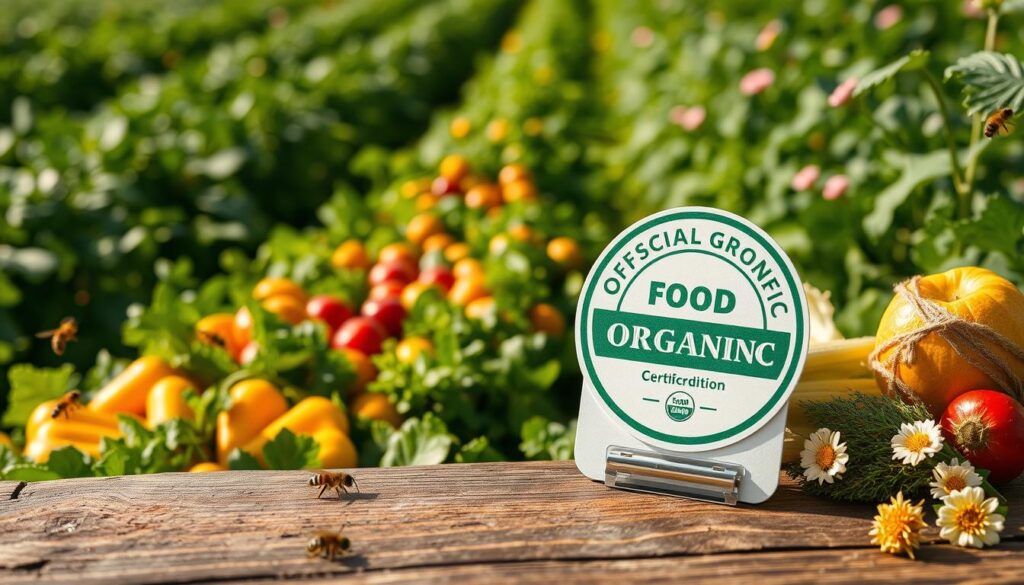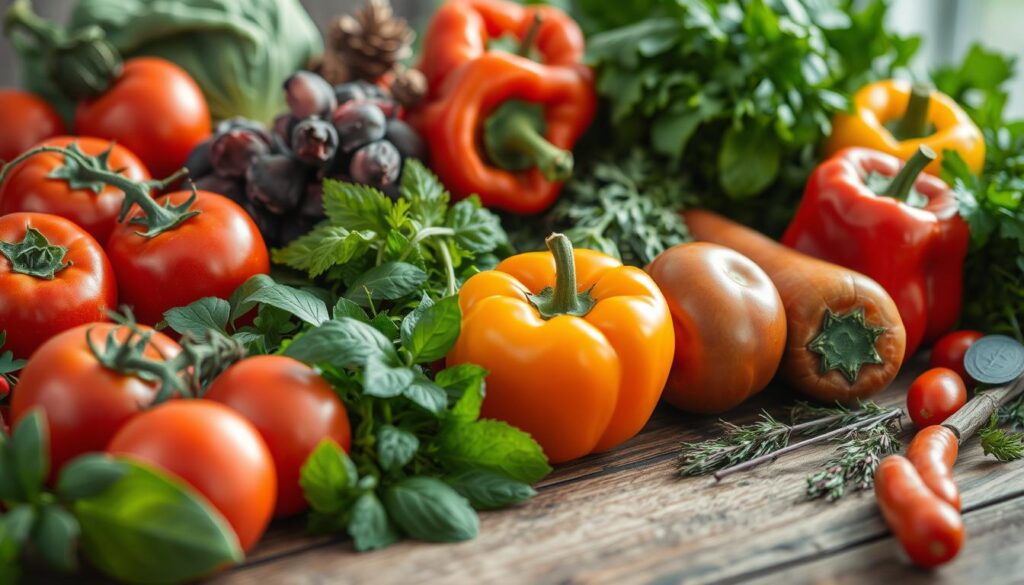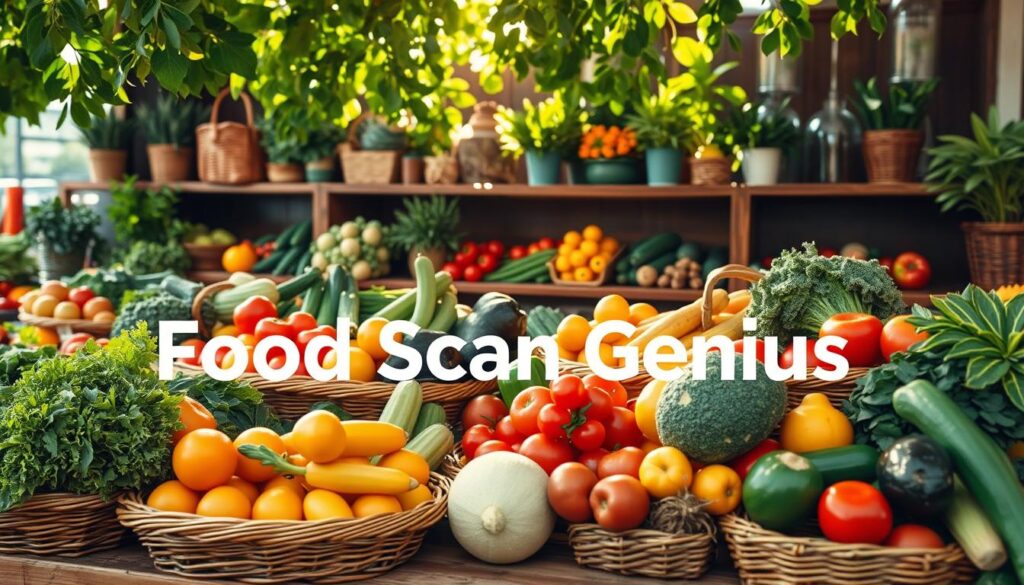Hey there, fellow health enthusiasts! 🌿 We’re excited to explore organic food together. It’s not just a trend; it’s a way to improve our health and the planet. In this guide, we’ll see how organic food boosts nutrition, protects the environment, and enhances taste.
We’ll also show you how Food Scan Genius (https://food.scangeni.us) can help you find organic products. So, grab a cup of herbal tea and let’s start this tasty journey!
Key Takeaways
- Organic farming avoids synthetic pesticides, herbicides, and fertilizers, making it more sustainable and eco-friendly.
- Organic foods, including meat and dairy, often have more beneficial nutrients like omega-3 fatty acids than conventional foods.
- Choosing organic reduces your exposure to harmful chemicals like glyphosate, which can harm your health.
- Organic farming promotes biodiversity and soil health, making the environment healthier.
- Organic products might be pricier, but they’re worth it for your health and the planet’s future.
What is Organic Food?
Organic food is made with methods that care for our planet. It’s different from regular farming because it doesn’t use harmful chemicals. Instead, it works with nature to grow food and raise animals in a kind way.
Definition and Key Principles
The USDA sets strict rules for organic food. Organic farming uses natural ways to make soil healthy and control pests. It doesn’t use harmful chemicals.
How Organic Food is Grown
- Organic farmers don’t use synthetic pesticides. They use natural ways like permaculture to control pests.
- Organic crops grow in soil that’s been free of harmful substances for at least three years.
- Organic animals live in conditions that let them act naturally. They eat 100% organic food and don’t get antibiotics or growth hormones.
Organic farming is all about caring for the earth. It gives people a healthier and greener choice.
Organic agriculture is not only about food. It’s also about nurturing the soil, protecting the environment, and sustaining our communities.”
| Organic Requirement | Standard |
|---|---|
| Organic Ingredients | 95% or more for “USDA Organic” labeling |
| Prohibited Pesticide Residues | 5% tolerance level |
| Permethrin Allowed on Peaches | 0.05 ppm for organic, 1.0 ppm for non-organic |
Learning about organic food helps us make better choices. It supports a greener future.
Nutritional Advantages of Organic Food
Organic foods often have more nutrients than non-organic ones. Studies show organic produce can have up to 69% more antioxidants. These antioxidants help protect our cells and support health.
Organic foods also have more antioxidants and vitamin C. Organic dairy and meat may have more omega-3 fatty acids and vitamins E and A.
Higher Antioxidant Levels
Organic foods grow in healthier soil. This leads to higher nutrient levels. Organic meat has more omega-3s and less saturated fats than non-organic meat.
Organic produce also has 30% less nitrates. This is good for our health.
Nutrient Density Compared to Conventional Choices
Organic foods don’t have synthetic pesticides or GMOs. This makes them a healthier choice. As people want better health, organic food’s popularity grows.
| Nutrient | Organic Foods | Conventional Foods |
|---|---|---|
| Antioxidants | Up to 69% higher | Lower levels |
| Vitamin C | Up to 52% higher | Lower levels |
| Omega-3 Fatty Acids | Higher levels | Lower levels |
| Nitrates | 30% lower | Higher levels |
Health Benefits of Consuming Organic
Choosing organic food can greatly improve your health. It reduces your exposure to harmful synthetic pesticides and antibiotics. Organic farming bans genetically modified organisms (GMOs) and limits synthetic substances to less than 40. This is compared to thousands of chemicals in conventional foods.
Reduced Exposure to Pesticides
Organic crops are grown without synthetic pesticides. This can have long-term negative health effects. Studies show organic foods have lower pesticide residues.
This may lower the risk of certain cancers and developmental issues. Pregnant women and children are more vulnerable to pesticide effects.
Lower Risk of Antibiotic Resistance
Organic livestock production bans antibiotics. This lowers the risk of antibiotic-resistant bacteria. An 18-month study found organic milk production improves milk quality.
Organic meat and dairy products are safer than conventional ones. They may contain antibiotic traces.
While organic doesn’t mean pesticide-free, it has lower synthetic chemical levels. This can positively impact your health and well-being. Choosing organic is a step towards a more environmentally conscious and regenerative agriculture lifestyle.
| Health Benefit | Organic vs. Conventional |
|---|---|
| Antioxidant Levels | Organic crops had 19-51% higher levels of antioxidants like phenolic acids, flavanones, and anthocyanins. |
| Nutrient Density | Organic produce contained significantly higher levels of Vitamin C, Iron, Magnesium, and Phosphorus. |
| Antibiotic Residues | 60% of conventional milk samples contained antibiotics, while organic samples did not. |
By choosing organic, you reduce harmful chemical exposure. You also support environmentally conscious and regenerative agriculture practices. This leads to better health for you and the planet.
Environmental Benefits of Organic Farming
Organic farming is key for our planet’s health. It offers many benefits that help us move towards a greener future.
Promoting Biodiversity
Organic farming avoids synthetic pesticides and fertilizers. This lets plants, insects, and animals live together. They make the landscape beautiful and keep our environment balanced.
Reducing Soil and Water Pollution
Without harmful chemicals, organic farming keeps soil and water clean. This protects our water and keeps it safe for drinking.
Organic farming also uses crop rotation and cover cropping. These methods improve soil health and reduce erosion. They help fight climate change by storing carbon.
Even though organic farming might need more land, it’s still better for the environment. It supports a sustainable food system for future generations.
“Organic farming can reduce agricultural emissions by 40-50% in Europe by 2050 if all farmland follows organic principles.” – (Rodale Institute)
Organic farming is good for our planet and our health. It’s a win-win for the environment and us.
Organic Food and Sustainable Practices
Organic agriculture is more than just growing healthier food. It’s about creating a sustainable future for our planet. At its core, organic farming focuses on two main things: keeping soil healthy and using natural ways to control pests. These methods help create a balanced ecosystem that works with nature, not against it.
Importance of Soil Health
Organic farming puts a big emphasis on soil health. Farmers use composting and minimal tillage to make soils rich in nutrients and good at holding moisture. These soils are home to beneficial microorganisms, which help the soil store carbon and prevent erosion.
Studies show organic farms use 45 percent less energy and have 40 percent fewer carbon emissions than conventional farms. This makes organic farming a key part of a sustainable future.
Crop Rotation and Natural Pest Control
- Crop rotation is key in organic farming. It stops pests from getting too strong and keeps the soil fertile. By changing what crops are grown, farmers break the life cycles of pests and weeds, cutting down on chemical use.
- Organic farmers also use natural ways to control pests. They introduce beneficial insects, use pheromone traps, and plant companion crops. These methods help keep the ecosystem balanced and promote biodiversity.
Organic farming might not produce as much as conventional farming, but its long-term benefits are clear. It focuses on soil health and uses sustainable practices. This makes organic agriculture a vital part of a regenerative food system that’s good for the environment and our health.
As we face climate change and environmental damage, the need for organic and permaculture practices grows. They are essential for a sustainable future.
Healthy soil is the foundation for healthy, nutrient-rich food and a thriving planet. Organic farming practices like composting and crop rotation are essential to building this vital resource.”
Labeling and Certification of Organic Products
Exploring non-GMO and eco-friendly organic foods can be complex. Knowing about labeling and certification standards is key. The USDA Organic seal is the top mark, showing a product is 95% or more organic. But, there’s more to it than just the green and white logo.
Understanding USDA Organic Certification
For a USDA Organic seal, producers must follow strict rules. They can’t use synthetic fertilizers, pesticides, or GMOs. The process includes detailed inspections to check if they meet organic standards.
Products can have labels like “100% organic,” “organic,” or “made with organic ingredients.” The “100% organic” and “organic” labels are the strictest. But, even “made with organic” items are good for those wanting to avoid harmful chemicals and support green farming.
Tips for Identifying Authentic Organic Products
- Look for the USDA Organic seal – this is the gold standard for certified organic products.
- Check the ingredient list – if the product is labeled as organic, the ingredients should reflect that.
- Be wary of “natural” claims, as this term is not regulated and does not guarantee the product is organic.
- Connect with local farmers at markets to learn about their growing methods, even if they can’t afford the full certification process.
By grasping the details of organic labeling and certification, you can make choices that match your values. This supports non-GMO, eco-friendly farming practices you believe in.

Cost Considerations for Organic Food
Many people worry about the cost of organic food. Organic farming is more expensive because it uses sustainable and environmentally friendly methods. This makes organic products pricier than non-organic ones.
Price Comparisons with Conventional Options
The price difference between organic and non-organic foods can be big. In 2010, organic spinach was only 7% more expensive, while organic eggs were 82% more. By 2015, organic food sales had grown to $37 billion, up from $11.5 billion in 2004. Yet, most organic products were still 20% or more expensive than their non-organic versions.
The Value of Investing in Health
Higher prices for organic food might seem like a big deal. But think about the benefits to your health and the planet. Organic farming is better for the environment and reduces pesticide use. Choosing organic means you’re getting healthier food and helping the planet.
To save money, focus on the “Dirty Dozen” and buy non-organic for the “Clean 15”. Buying local and seasonal organic produce can also be cheaper than imported options.
“When it comes to food, quality is much more important than quantity. – Randi Hutter Epstein”
Deciding to buy organic is a personal choice. But the health and environmental benefits might be worth the extra cost. By being smart with your budget, you can enjoy the benefits of sustainable farming and eco-friendly practices.
| Product | Organic Price Premium |
|---|---|
| Spinach | 7% |
| Eggs | 82% |
| Granola | 22% |
| Carrots | 20% |
| Canned Beans | 54% |
Accessibility of Organic Food
The demand for organic food is rising fast. This has made it easier to find in the United States. But, getting to these products can be harder in some places, especially in rural areas.
Urban vs. Rural Availability
In cities, you can find many organic foods in big supermarkets and specialty stores. But, in rural areas, there are fewer stores. Yet, people there can buy directly from local farmers.
Farmers’ Markets and Community Supported Agriculture (CSA)
Farmers’ markets are great for buying fresh, local organic food. They let you meet the farmers. Community Supported Agriculture (CSA) programs also help by delivering organic food right to your door.
Online stores and food co-ops are making organic food more available everywhere. This is because more people want healthy, eco-friendly food. But, some places still struggle to get these products easily.
| Metric | Urban Areas | Rural Areas |
|---|---|---|
| Organic Food Availability | Higher availability in mainstream supermarkets and specialty stores | Fewer conventional retail outlets, but more direct access to organic farms |
| Accessibility | Increased options in urban centers | Potential challenges in accessing organic products |
| Farmers’ Markets and CSAs | Provide alternative sources of organic produce | Offer direct connection to local organic farmers |
The need for organic and regenerative food is making it easier to find everywhere in the U.S. But, some places still have trouble getting these healthier foods.
Cooking and Preparing Organic Food
Using organic ingredients in your cooking is fun and rewarding. Supermarkets now offer more organic options. This makes it easy to add these healthy foods to your meals.
Tips for Incorporating Organic Ingredients
Cooking with organic ingredients is like regular cooking, but you focus on natural flavors. Always wash organic produce well, even if it has fewer pesticides. Organic foods might not last as long, so plan your meals ahead.
Choosing organic means no synthetic pesticides or GMOs in your food. This makes your meals healthier and more wholesome.
Meal Prep Ideas for a Busy Lifestyle
For busy people, prepping organic ingredients ahead of time is a big help. Try organic slow cooker recipes or one-pot meals for easy dinners. Use less common organic veggies like nutrient-rich kale or natural pesticides-resistant swiss chard to add variety to your meals.
Remember, organic doesn’t always mean healthier if the dish is high in sugar or unhealthy fats. Balance is important.
| Organic Ingredient | Prep Tip | Meal Idea |
|---|---|---|
| Organic Carrots | Peel and chop in advance | Roasted Organic Carrots with Honey and Thyme |
| Organic Quinoa | Cook and store in the fridge | Organic Quinoa Burrito Bowls |
| Organic Chicken Breasts | Marinate and freeze for later use | Grilled Organic Chicken with Roasted Vegetables |
By using organic ingredients in your cooking, you get the benefits of natural pesticides-free, nutrient-rich foods. These foods nourish your body and taste great.

Debunking Myths About Organic Food
There are many wrong ideas about organic food. Let’s clear up the confusion. This will help you choose better, focusing on sustainable farming and non-GMO options.
Common Misconceptions
Many think organic food is always better for you. But, the truth is, its health benefits can vary. Organic farming tries to avoid synthetic pesticides, but it’s not always pesticide-free.
Some believe organic food is more nutritious. But, research shows mixed results. Taste also depends on many things, not just if it’s organic.
Evidence-Based Rebuttals
- Natural pesticides in organic farming can still be harmful. They’re not always safer than synthetic ones (3).
- Organic foods might have a bit more vitamins and minerals. But, the differences are not always big (4).
- Organic farming is better for the soil and water. It uses methods like crop rotation and composting (5).
- To be labeled “organic,” a product must have at least 95% organic ingredients (6).
The organic food market has grown a lot. In 2010, it was $26.7 billion in the U.S. Now, it’s about $52 billion worldwide. But, organic products are often more expensive.
Choosing between organic and conventional food is up to you. It’s key to make choices that fit your needs and values. Knowing the facts about organic food helps you make better decisions.
Organic Food and Diet Trends
More people want healthier and sustainable food choices. Organic foods are key in many diet trends. This includes plant-based, paleo, and clean eating lifestyles. It shows how important biodynamic agriculture and eco-friendly food choices are becoming.
Popular Diets Incorporating Organic Foods
Organic foods fit well with today’s diets. Plant-based diets focus on organic fruits, veggies, and whole grains. This helps avoid harmful chemicals. The paleo diet also chooses organic meats and produce for a cleaner diet.
The clean eating trend supports organic foods too. It’s all about eating foods that are as close to nature as possible. This trend is all about choosing foods that are good for you and the planet.
Future Trends in Organic Consumption
The organic market is growing fast. New trends show organic consumption will keep changing. People are interested in regenerative organic farming, which improves soil and biodiversity.
There’s also a rise in demand for organic plant-based proteins and easy-to-find organic meals. With more affordable organic options and wider availability, the organic industry is set to grow. It will meet the needs of health-conscious consumers looking for eco-friendly and biodynamic foods.
“The future of food is organic. Consumers are becoming more aware of the health and environmental benefits of organic farming, driving increased demand for these products across all food categories.
| Organic Food Trend | Description |
|---|---|
| Plant-Based Organic | Organic fruits, vegetables, legumes, and whole grains are the foundation of many plant-based diets. |
| Regenerative Organic | A farming approach that goes beyond organic to actively improve soil health and biodiversity. |
| Organic Convenience Foods | Demand for organic ready-to-eat meals, snacks, and other convenient options is on the rise. |
| Organic Beauty Products | Organic ingredients are increasingly found in personal care items like skincare and cosmetics. |
Conclusion: Making Informed Choices
Exploring the benefits of organic food shows us how it can improve our health and the planet. Starting an organic lifestyle might seem hard, but it’s doable in small steps.
Steps to Transition to an Organic Lifestyle
Start by focusing on the Dirty Dozen, fruits and veggies with high pesticide levels. Slowly add more organic foods to your diet. Use tools like Food Scan Genius to choose wisely at the store.
Think about how your choices affect the environment. They help reduce harmful chemicals and support farming that’s good for the soil and nature.
Final Thoughts on Organic Living
Organic living is more than just eating right. It’s a way to live healthier and help the planet. It’s not about being perfect, but every step towards organic helps.
By choosing organic and supporting sustainable farming, we all play a part in a greener future. This includes using organic and BCI cotton.
FAQ
What is organic food?
Organic food is made without synthetic chemicals. It’s grown naturally, without GMOs. This way, it’s better for the environment.
What are the nutritional advantages of organic food?
Organic foods have more antioxidants and vitamins. They also have more minerals and omega-3s than non-organic foods.
How does organic farming benefit the environment?
Organic farming boosts biodiversity. It also cuts down on pollution and helps fight climate change. This is because it improves soil health.
What are the health benefits of choosing organic?
Organic foods have fewer pesticides. This can lower cancer and developmental risks. It’s especially good for pregnant women and kids.
How can I identify authentic organic products?
Look for the USDA Organic seal. Check the ingredient lists. Remember, “natural” doesn’t mean organic. Talking to local farmers can help too.
Is organic food always more expensive?
Yes, organic food usually costs more. This is because of the hard work and certification costs. But, think about the health and environmental benefits.
Are there any common myths about organic food?
Some think organic food is always better. But, it’s not always pesticide-free or more nutritious. Organic farming does use pesticides, but they’re natural.
How can I transition to an organic lifestyle?
Begin by choosing organic for foods with high pesticide levels. Then, add more organic items to your diet. Use apps like Food Scan Genius to help you shop.





